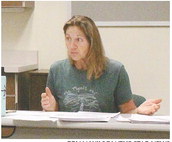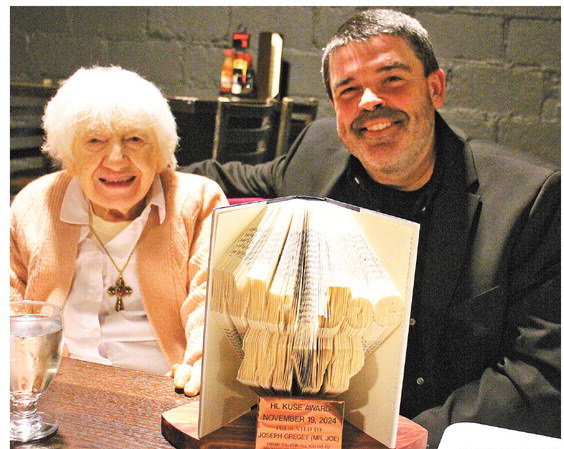Critical of coverage


County rejects change to ambulance contract for additional wage costs
Taylor County will hold Aspirus to the cost split in the existing service contract despite rapidly rising staff costs due to critical coverage.
After kicking the can down the road for the past few months, members of the Taylor County Law Enforcement and Emergency Services committee on Friday formally rejected an amendment to ambulance service contract which would have shifted more of the costs for the critical coverage to county taxpayers.
Faced with not enough ambulance crews to cover shifts, particularly in the Gilman and Rib Lake areas early last spring, the county authorized offering critical coverage rates to provide incentives for Aspirus staff from both this area and around the region.
Ambulance administrator Bob Kirkley told committee members that due to the extra pay incentives under the criti- See COMMITTEE on page 5 cal coverage status, the salaries for the ambulance service are currently $238,000 above what was budgeted. Under the agreement with the county and Aspirus, the cost the county is responsible for is 45% of the budget of the department.
Under that agreement, Aspirus promises to provide 24 hour a day coverage for the county residents. The ambulance service has come under fire, particularly among those in the Gilman area regarding coverage gaps due to staffing. Kirkley explained that at the time the contract was reached it was with the understanding that it would be staffed with a combination of on-call personnel from the community and full-time staff.
Due to demographic changes with on-call ambulance crew members retiring as well as the loss of crew members during the period of federally mandated COVID-19 restrictions, the number of on-call personnel willing to take shifts has dwindled. This has left Aspirus needing to pay full time emergency medical service employees to cover shifts. The federal mandates and all COVID-19 requirements have been lifted, but Kirkley noted people still haven’t come back.
Kirkley described that system as being unsustainable given the overall low call volumes at each of the three ambulance locations. In the past, Rib Lake, Medford and Gilman had maintained separate licenses, although it has always been a single county-wide service, the county merged them into a single license to make it easier to shift staff from one area to another. Kirkley noted that with the call volumes in each of the areas, the state would have likely pulled the licenses for not having enough volume.
According to Kirkley, having full time crews in each area is not the best option and said what is needed in Gilman is to have an on-call crew. However, there have not been people willing to do this.
“Could we look at reversing that?” asked committee chair Lynn Rosemeyer. Rosemeyer is new to the committee and replaces former chairman Lester Lewis who is no longer on the county board.
Rosemeyer questioned if there were people at Gilman Cheese or at the school district who could be oncall while they were working. Kirkley said he has spoken with the crew member who works at the school offering that option to him, but the individual has not wished to leave his classroom for calls.
“I may have a conversation with the school superintendent,” Rosemeyer said.
“I don’t think this committee or the county board feels we are covering Gilman and Rib Lake properly,” said committee member Lorie Floyd. She objected to the idea that the coverage terms of the contract are being met by having a crew in Medford.
Kirkley explained the issue goes far beyond Taylor County and is statewide and nationwide with not having enough people going into EMS. He noted that he is driving to Ironwood two night a week to teach classes and that he was willing to work with the technical colleges to offer classes in Taylor County.
“It isn’t just Taylor County, it is everywhere through the United States,” Kirkley said.
Floyd questioned if people weren’t interested in getting the training to be EMTs then why would they be interested in getting classes to be first responders, referring to efforts to get a county-wide first responder program underway in the county. There is a significant difference in the number of hours of training for each level.
Committee member Ray Soper questioned the rationale for changing the contract in the middle of the year and stated that Aspirus should have been aware of the staffing issues.
“We have a contract. I think it needs to be upheld for this year,” said committee member Chuck Zenner.
Committee member Catherine Lemke agreed noting the budget is coming up and they would need to figure out something for 2024.
The county ambulance service subsidy is not part of the overall tax levy limit that impacts other county operations, but is a separate levy, similar to how debt service is figured and included in the overall county taxes.
Rosemeyer also raised questions about why Scott Copenhaver was not hired back to work for the ambulance service. Copenhaver lives in Gilman and served on the ambulance service there for many years. During Covid-19 he left Taylor County Ambulance Service and is currently working for the ambulance service in Rusk County. Rosemeyer said the public needs to know why he was not hired back.
Kirkley said that due to confidentiality he could not give her that information. Zenner defended Kirkley’s stand noting there are privacy concerns and that with anything personnel related just because the committee members may not know the details it doesn’t mean it isn’t justified.
In the end the committee members voted unanimously to reject the proposed amendment to the contract that would have shifted the additional personnel cost due to the critical coverage to the county.
In related action, Rosemeyer made a request from sheriff Larry Woebbeking for the call information regarding an ambulance call that occurred this spring with an individual who died.
“It might help us in some decision making,” Rosemeyer said, explaining she was interested in putting together a timeline of what had happened that day and “what really did transpire” with call and response times.
Woebbeking said he would compile the reports for the sheriff’s department and dispatch and would forward the request to the Gilman Police Department to share their records of the event.





